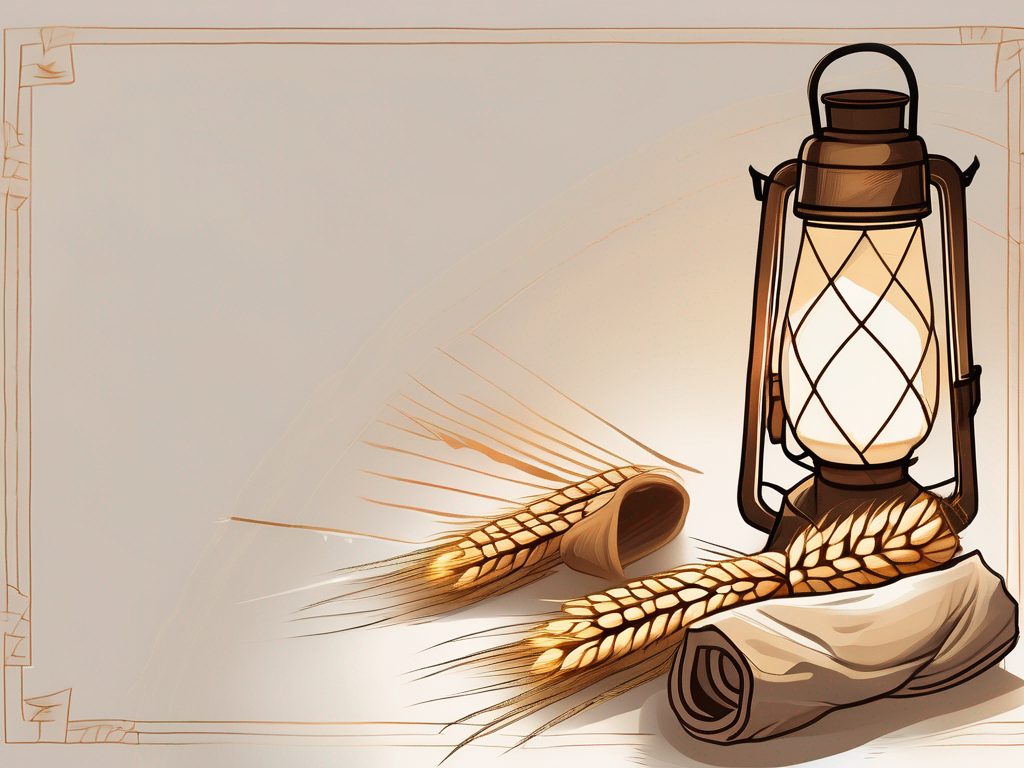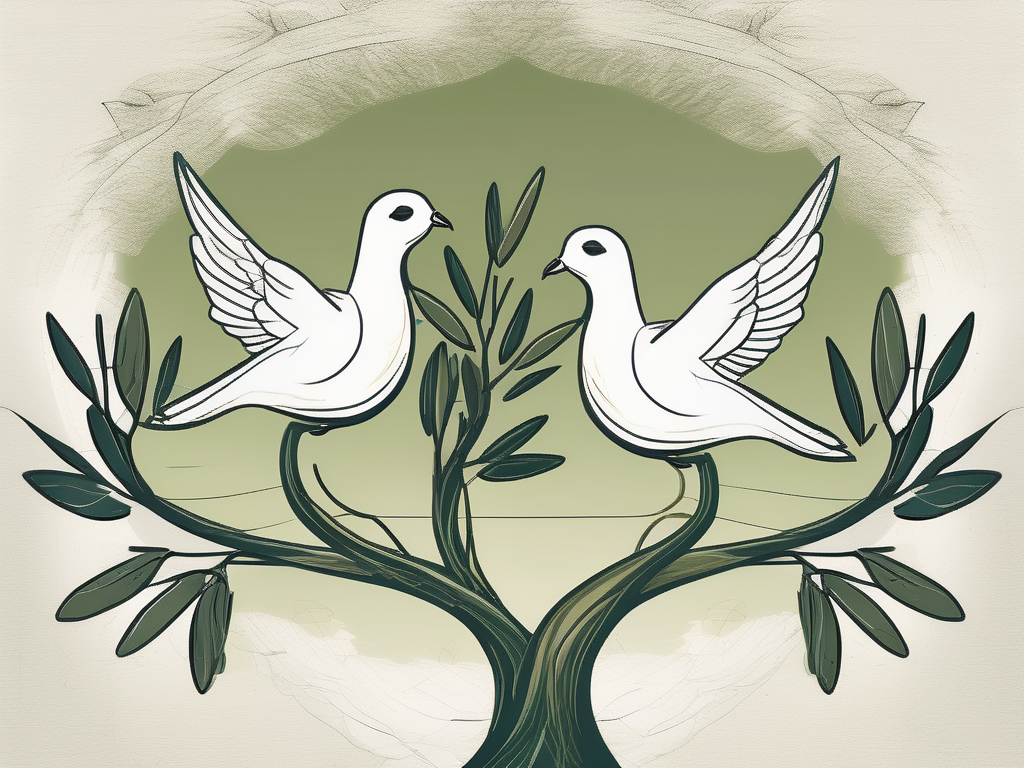Boaz is a significant figure in Judaism, appearing in the biblical account of the Book of Ruth. Understanding his role in Jewish history and the impact he had on laws and customs can shed light on the rich tapestry of Jewish tradition. In this article, we will explore the historical context of Boaz, delve into the biblical account of his life, examine the significance of his character, and discuss his influence on Jewish laws and customs. Finally, we will consider how Boaz is interpreted in modern Judaism and the lessons we can learn from his story.
Understanding the Historical Context of Boaz
Boaz lived during a fascinating time in Jewish history. It is essential to comprehend the context in which he operated to understand his significance fully. Boaz lived during the time of the judges, a period of Israelite history in which no central government or king ruled over the people. It was a time of moral and spiritual decline, with a lack of unity and political leadership.
During this tumultuous period, the Israelites faced numerous challenges and threats from neighboring nations. The Philistines, Ammonites, and Moabites were among the constant adversaries who sought to oppress and conquer the Israelites. The lack of a strong central authority made it difficult for the Israelites to defend themselves effectively.
Amidst this chaotic backdrop, Boaz stood out as a beacon of righteousness and compassion. His actions and character demonstrated a deep commitment to the values and principles of his faith. Despite the prevailing moral decline, Boaz remained steadfast in his devotion to God and his people.
Boaz’s righteousness extended beyond his personal piety. He actively sought to alleviate the suffering of those around him, particularly the vulnerable and marginalized. In the Book of Ruth, we see Boaz’s compassion and generosity towards Ruth, a Moabite widow who found herself in a foreign land.
Boaz’s kindness towards Ruth went beyond mere charity. He recognized her as a fellow human being deserving of dignity and respect. In a society that often overlooked the plight of widows and foreigners, Boaz’s actions were revolutionary. His willingness to go above and beyond societal norms set him apart as a true leader and example to others.
Furthermore, Boaz’s role in the genealogy of King David and, ultimately, the Messiah, cannot be overstated. Through his marriage to Ruth, Boaz became a crucial link in the chain of ancestry that led to the birth of Jesus Christ. His significance in the grand narrative of salvation history cannot be underestimated.
As we delve deeper into the historical context of Boaz, we gain a richer understanding of his character and the challenges he faced. His story serves as a reminder that even in the darkest times, individuals can rise above the prevailing circumstances and make a lasting impact. Boaz’s legacy continues to inspire and guide us today, reminding us of the power of righteousness, compassion, and faith.
The Biblical Account of Boaz
In the Book of Ruth, Boaz plays a central role in the story’s progression. The book itself is unique in the Bible, as it focuses on the personal lives of individuals rather than grand historical events. Boaz, a wealthy landowner and relative of Elimelech, Naomi’s deceased husband, takes center stage.
Boaz in the Book of Ruth
Boaz’s encounter with Ruth, Naomi’s daughter-in-law, is the central plot point of the book. Ruth, a widow from Moab, accompanies Naomi back to Bethlehem after facing hardships. Boaz shows compassion and kindness to this foreign woman, allowing her to glean in his fields and providing protection and support for her and Naomi. Through legal means, Boaz eventually marries Ruth, demonstrating his commitment to fulfilling the kinsman-redeemer role.
As the story unfolds, we see Boaz’s character shining through in various ways. His generosity extends beyond providing for Ruth’s immediate needs. He ensures that she has access to the best parts of his fields, allowing her to gather more grain than she could have on her own. Boaz’s actions reflect not only his kindness but also his understanding of the importance of justice and fairness.
Boaz’s role as a kinsman-redeemer is significant in the context of ancient Israelite society. The kinsman-redeemer was a male relative who had the responsibility to protect and provide for the widows and orphans in the family. Boaz takes this role seriously, not only marrying Ruth but also taking steps to secure her and Naomi’s future. His actions demonstrate his commitment to upholding the principles of justice and compassion that are central to the Jewish faith.
Boaz’s Role and Actions
Boaz’s role in the Book of Ruth extends beyond being a supportive figure for Ruth and Naomi. His actions reflect the core virtues valued in Judaism: kindness, generosity, and justice. Boaz’s actions embody the spirit of the Torah, demonstrating the importance of caring for the vulnerable and disadvantaged in society. His marriage to Ruth also symbolizes the blending of different cultures and backgrounds within the Jewish people.
Furthermore, Boaz’s character serves as a model for individuals today. His willingness to go above and beyond in helping others, regardless of their background or circumstances, is an inspiration. Boaz’s story reminds us of the power of compassion and the impact one person can have on the lives of others.
In addition to his role as a kinsman-redeemer, Boaz’s actions also highlight the significance of community and interconnectedness. By marrying Ruth, a foreigner, he not only fulfills his duty but also demonstrates the importance of embracing diversity and accepting others. Boaz’s story serves as a reminder that we are all part of a larger community and that our actions can have far-reaching effects.
Overall, the biblical account of Boaz provides a rich and inspiring narrative. His character exemplifies the values of kindness, generosity, and justice, and his actions demonstrate the power of compassion and community. Boaz’s story continues to resonate with readers today, reminding us of the importance of caring for others and embracing diversity.
The Significance of Boaz’s Character
Boaz’s character is admired and celebrated in Judaism for several reasons.
Boaz, a prominent figure in the Book of Ruth, exemplifies many virtues that are highly regarded in Jewish tradition. His kindness and compassion towards Ruth and Naomi demonstrate the importance of caring for others and extending help to those in need. Boaz’s selflessness is evident as he goes above and beyond to ensure the well-being of Ruth and Naomi, providing them with food and protection.
In addition to his kindness, Boaz’s commitment to upholding justice is another virtue that is highly praised. He conducts his business affairs with integrity and treats others fairly, regardless of their background or social status. Boaz’s actions serve as a reminder of the importance of fairness and justice in Jewish ethics and the responsibility to treat all individuals with dignity and respect.
Boaz’s Legacy in Judaism
Boaz’s actions in the Book of Ruth left a lasting impact on Jewish thought and practice. His marriage to Ruth, a Moabite woman, serves as a symbol of inclusivity within the Jewish community and the welcoming of converts. This act of acceptance and integration highlights the value of embracing diversity and the belief that all individuals, regardless of their origins, can contribute to the Jewish faith.
Furthermore, Boaz’s lineage is connected to King David, one of the most revered figures in Jewish history. Boaz is the great-grandfather of David, and this familial connection holds great significance in Jewish theology. It establishes Boaz as an ancestor of the Messiah, the future savior who will bring redemption to the Jewish people. This connection to the Messiah reinforces Boaz’s importance in Jewish history and theology, as his actions play a crucial role in the fulfillment of divine prophecy.
In conclusion, Boaz’s character is highly regarded in Judaism due to his embodiment of virtues such as kindness, compassion, and justice. His actions in the Book of Ruth serve as a moral compass for individuals, emphasizing the importance of caring for others, upholding justice, and embracing diversity within the Jewish community. Boaz’s legacy is not only significant in terms of his impact on Jewish thought and practice but also in his connection to King David and the future Messiah.
Boaz’s Impact on Jewish Laws and Customs
Boaz’s influence is not limited to the narrative of the Book of Ruth. His example and actions have had a profound impact on Jewish laws and customs.
Boaz and Jewish Marriage Laws
Boaz’s marriage to Ruth sets a precedent for Jewish marriage laws regarding converts. His acceptance of Ruth into the Jewish community demonstrates the importance of embracing and supporting individuals who choose to join the faith. This principle continues to shape Jewish marriage practices today.
Boaz’s Influence on Jewish Customs
Boaz’s character has been celebrated throughout history, with rituals and customs developed around his story. In some Jewish communities, the festival of Shavuot is associated with Boaz and the harvest season. It is a time to reflect on his virtues and the values he exemplifies.
Interpreting Boaz in Modern Judaism
In modern Judaism, there are varying interpretations of Boaz and his significance. However, some common themes emerge.
Contemporary Views on Boaz
Many scholars and religious leaders emphasize Boaz’s kindness, generosity, and commitment to justice as qualities to emulate in everyday life. His story serves as a reminder to act compassionately towards others and uphold righteousness.
Lessons from Boaz for Today’s Jews
The story of Boaz resonates with many lessons that are relevant for Jews today. It reminds us to be inclusive and welcoming to all, regardless of their background or origin. Boaz’s actions teach us to prioritize acts of kindness and justice in our interactions with others, and to recognize the transformative power of compassion and empathy.
In conclusion, Boaz’s place in Judaism is firmly established through his role in the Book of Ruth, his virtues, and his influence on Jewish laws and customs. By understanding the historical context of Boaz, his biblical account, his significance as a character, and his impact on Jewish traditions, we gain insights into the depth and richness of Jewish theology and practice. Moreover, interpreting Boaz in modern Judaism reminds us of timeless lessons and virtues that continue to shape the Jewish community today.












